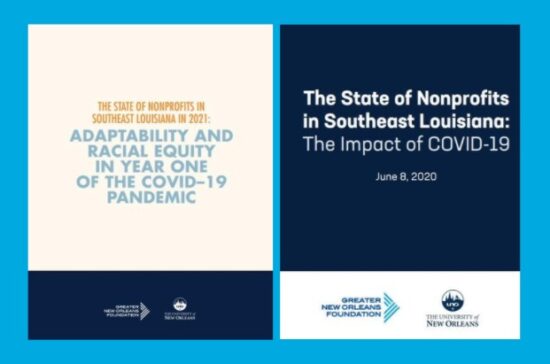The Greater New Orleans Foundation’s Nonprofit Leadership and Effectiveness program has conducted studies on the region’s nonprofit sector since 2011. The studies have helped to ensure that the Foundation is aware of and is responsive to the critical needs of nonprofits in the 13-parish region.
In recent years, the Foundation has partnered with the University of New Orleans (UNO) to conduct more extensive nonprofit study efforts. In 2020, the focus of the partnership was to conduct a study on the effects of the COVID-19 pandemic to nonprofits in the Foundation’s 13 parish region. This partnership led to the production and release of The State of Nonprofits in Southeast Louisiana: The Impact of COVID-19 report. The Foundation partnered with UNO again in 2021 to design and execute a more comprehensive study, resulting in the production and release of The State of Nonprofits in Southeast Louisiana 2021 – Adaptability and Racial Equity in Year One of the COVID-19 Pandemic report.
For a brief and visual glimpse into the follow-up study, read our two-pager.

Over 100 Nonprofits Stakeholders Attended a Special Town Hall
On February 22, 2022, the Foundation held a special virtual town hall specifically for nonprofits about the 2021 study. The goal of the virtual town hall was to share study results with the nonprofit community and to provide an informal update from nonprofit leaders a full year after the study was conducted. The virtual town hall engaged attendees via interactive polling and chat features, to obtain snapshot data of how nonprofits were faring a year after the 2021 study.
For the interactive Special Town Hall there were 106 participants and, on average, 67 participants answered poll questions. It is important to note that there are limitations to the data collected during this town hall. For example, the virtual town hall had a much smaller respondent pool as compared to the number of nonprofits that responded to the 2021 survey. Only 31 percent of respondents to the virtual town hall poll said that they also responded to the 2021 survey. The data gathered from the virtual town hall should not be weighed equally to the 2021 in-depth survey. Instead the data should be understood as a less formal update to the data collected from the comprehensive 2021 survey.
The poll questions asked during the virtual town hall covered topics including self-care, representation of people of color in nonprofit leadership, and prioritization of racial equity and justice within organizations. It is important to note that the methodology of using close-ended poll questions, like the one conducted during the virtual town hall, does not allow for the interpretation of nuance regarding the complexity of the questions. As a Community Foundation, it is important to acknowledge the importance of learning and iterating upon which best practices that allow for the most reliable data collection in the subject areas covered in the poll questions.
Virtual Town Hall Poll Findings
- Many budgets have increased or stabilized in the past year, but a quarter have decreased. Many respondents noted that earned income and/or individual donations were down, but government contracts and private/corporate funders had increased and made up for the gap. Other nonprofits reported the opposite trend with their funding—this shows there isn’t an exact path to stability within the sector. Nonprofits also named that they needed support from and relationships with banking institutions, and that multi-year and operational support funds are crucial to their survival.
- Demand for nonprofit services has continued to grow due to the pandemic and Hurricane Ida. Participants noted increases in the following areas: health disparities, domestic violence, and evictions. Respondents in the chat reported increases in people seeking assistance with needs such as access to technology and the internet, unemployment, filing for benefits, and insurance appeals.
- While many nonprofits have managed to stabilize budgets and staffing, staff self-care and burnout are major concerns. Continued demands on strained staff were voiced, and one respondent said, “We’ve made an effort to make sure everyone has the resources they need to have a more balanced work/life dynamic.” Other respondents shared the following methods of promoting self-care: weekly check-ins, encouraging mental health days, a four-day work week, weekly staff lunch, unlimited paid time off, flexible hours, and dedicated self-care funds to be used at the employee’s discretion.
- More nonprofits appear to be prioritizing racial equity and justice in the past year, and BIPOC representation is increasing in boards and some executive teams, but more work is needed. Participants in the chat mentioned efforts to make their board composition reflect the communities they are serving. From the chat, it seems organizations are prioritizing justice efforts and are intentionally making diversity part of their organizations plans for hiring and board recruitment. However, there is an overall agreement that more work is needed in these areas.
- The virtual world is here to stay. Many organizations noted that remote work, flexible schedules, virtual learning and appointment options, and virtual board meetings will be permanent options for their organizations going forward. Some respondents noted that IT support was needed within their organizations to sustain their new, virtual work environments.
During the virtual town hall meeting, it became clear that the combination of Hurricane Ida and the length of time the pandemic, have taken a toll on nonprofit staff members. Despite this, nonprofits have risen to the occasion by adapting their fundraising strategies and service offerings, while meeting an increased demand for their services in the community.
Nonprofits need more flexible and consistent funding to continue meeting the demand for services while caring for staff. In Southeast Louisiana, we depend on nonprofits to get through hard times, and they also depend on us to survive and thrive. Our commitment to them should be just as unwavering.
To learn more about these studies, the town hall webinar, or our Nonprofit Learning & Effectiveness programmatic efforts, reach out to Kellie Chavez Greene, Vice President for Programs, at kellie@gnof.org.